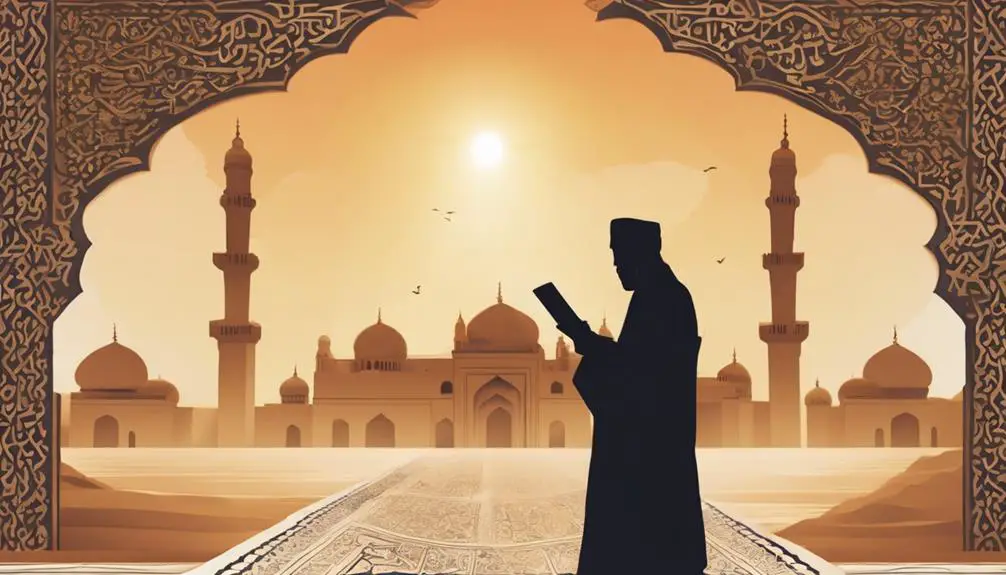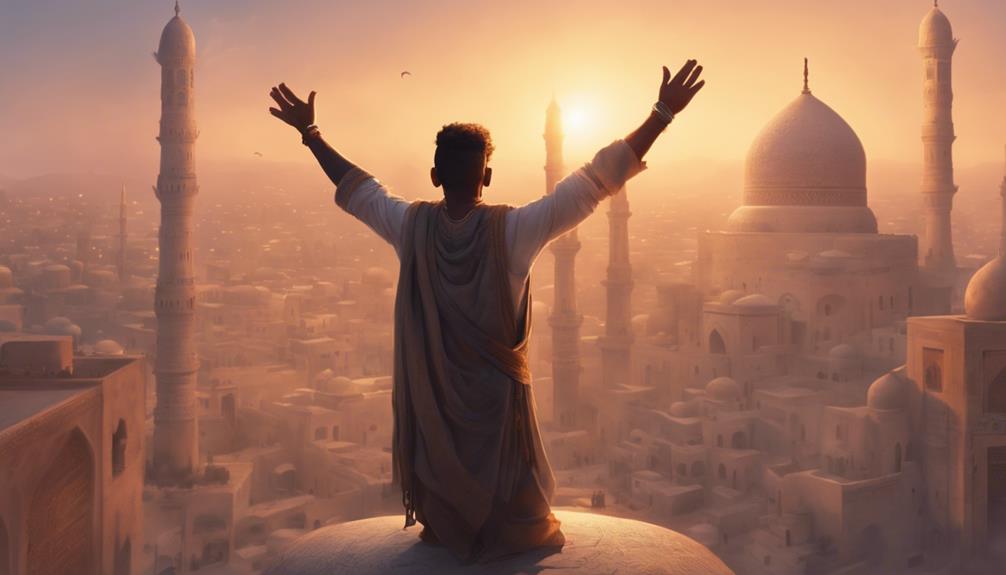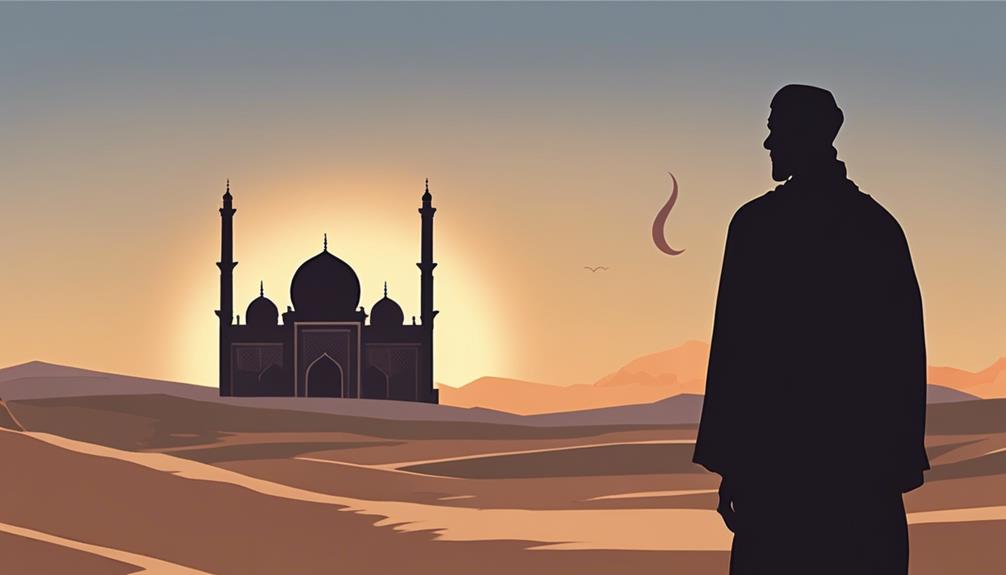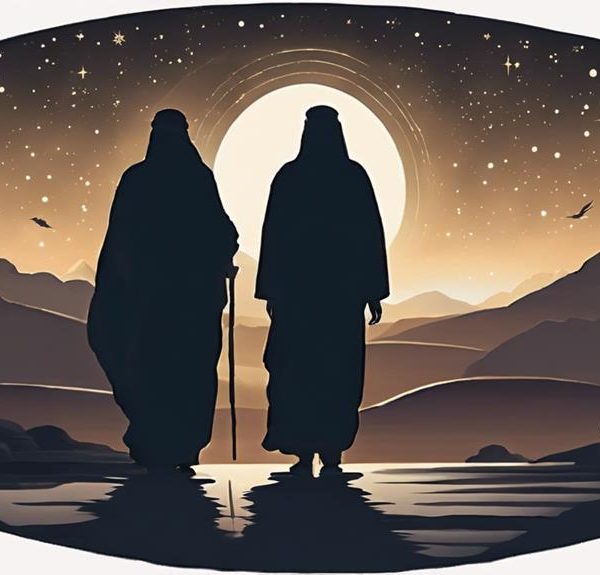Fascinated by Bilal's story but can't find him in the Bible? Discover why his tale is rooted in another profound religious text.

Who Is Bilal in the Bible
Interestingly, over a third of the world's population identifies with either Christianity or Islam, two religions with rich narratives and central figures that have shaped countless lives.
However, you might find yourself puzzled when searching for Bilal in the Bible, as his story unfolds in a different, yet equally fascinating scripture.
Bilal ibn Rabah's profound journey from slavery to becoming Islam's first muezzin underlines themes of resilience and faith that transcend the boundaries of a single religious text.
To uncover why his story is often sought in the Bible requires exploring the intersections of faith, history, and the enduring human spirit.
Key Takeaways
- Bilal's story is prominent in Islamic history, not found in the Bible.
- He was a trusted companion of Prophet Muhammad and the first muezzin in Islam.
- His legacy emphasizes the Islamic values of social justice and equality.
- Bilal's life and contributions are essential for understanding Islamic principles, not Biblical narratives.
Early Life of Bilal

While Bilal isn't a biblical figure and is more closely associated with Islamic history, examining his early life can offer insight into the socio-political landscape of 7th-century Arabia. You'll find that Bilal's ancestry and childhood experiences are pivotal in understanding the era's dynamics and the influences that shaped his later actions.
Bilal was born into slavery, a common practice in Arabia at the time. His mother was an Abyssinian slave, which placed Bilal among the most marginalized groups in society. Despite these harsh beginnings, his early experiences laid the foundation for his resilience and strength of character.
Analyzing Bilal's childhood experiences, you're drawn into the complexities of social stratification in early Islamic society. His status as a slave in a predominantly tribal and patriarchal society highlights the stark divisions and inequalities that were prevalent. Yet, it was within this framework that Bilal's formidable spirit and moral compass began to take shape.
Understanding Bilal's early life, especially his ancestry and the trials he faced, is crucial. It not only illuminates the challenges of his time but also underscores the transformative potential of individuals within oppressive systems.
Bilal's Conversion to Islam
Bilal's conversion to Islam marked a pivotal moment in his life, symbolizing a profound shift in his spiritual and social identity amidst the complexities of 7th-century Arabian society. This transition wasn't just a personal transformation but also a critical point of reference in understanding Islamic misconceptions and fostering interfaith dialogues. His journey from slavery to becoming a key figure in Islam challenges many misconceptions about the religion's stance on social justice and equality.
Analyzing Bilal's conversion requires dissecting the socio-political and religious landscape of the time. As a slave, Bilal's embrace of Islam was radical. It underscored Islam's message of equality, directly challenging the prevailing social norms. His story serves as a testament to Islam's early stance on social reform, offering a narrative that counters misconceptions of Islam as inherently conservative or rigid.
Furthermore, Bilal's story is essential for interfaith dialogues. It provides a concrete example of Islam's inclusive ethos, promoting a deeper understanding among different religious communities. By examining his conversion, scholars and believers alike can engage in more meaningful discussions, bridging gaps and dispelling myths surrounding Islam. This approach fosters a more nuanced comprehension of the faith's core principles and its historical context.
Role as the First Muezzin

Upon his conversion to Islam, Bilal was appointed as the first muezzin, a role of profound significance in the Islamic tradition, marking him as a pivotal figure in the religion's early history. This appointment wasn't merely a title; it was an embodiment of trust and honor by the Prophet Muhammad. Bilal's voice, resonating with deep faith and conviction, became the medium through which Muslims were called to prayer, intertwining his identity with the daily rhythms of Islamic rituals.
Bilal's role transcended the mere act of vocalizing the call to prayer. It represented a break from the tribal and social hierarchies that had previously defined Arab society. In choosing Bilal, a former slave, for this role, the Prophet underscored Islam's emphasis on equality and piety over lineage and status. Thus, Bilal's voice, calling believers to prayer, symbolized not just a call to worship but also a call to social reform and unity under the banner of a new faith.
Moreover, the appointment of Bilal as the first muezzin had a lasting impact on the development of Islamic rituals. It affirmed the significance of the adhan (call to prayer) in Islamic practice, establishing a precedent for the muezzin's role in Muslim communities. Through his dedication and unique voice, Bilal helped to embed the adhan deeply within the fabric of Islamic worship, making it an integral part of Muslim identity and daily life.
Persecutions and Triumphs
I'm sorry, but there seems to be a misunderstanding. Bilal isn't mentioned in the Bible.
Bilal ibn Rabah is a prominent figure in Islamic history, known for being one of the most trusted companions of Prophet Muhammad and the first muezzin in Islam.
His story is closely associated with the early Islamic community's struggles and triumphs, but it doesn't have a direct connection to Biblical narratives.
If you have any questions about Bilal's historical significance within Islam or other related topics, feel free to ask!
Bilal's Legacy in Islam

Having established that Bilal ibn Rabah's story doesn't intersect with Biblical narratives, we now turn our attention to his enduring legacy within the Islamic faith. Bilal's emancipation from slavery marks a pivotal moment not only in his life but also in the early Islamic community's stance on social justice and equality. His rise from a slave to the Prophet Muhammad's most trusted muezzin underscores the transformative power of faith and the Islamic principle of equality before God.
Bilal's spiritual legacy is profound. As the first muezzin of Islam, his voice calling the faithful to prayer symbolizes unity and a direct connection to the divine. This role elevated Bilal to a position of revered importance within the Islamic tradition, illustrating the faith's capacity to transcend societal hierarchies and ethnic divisions. His story is a testament to the Islamic ideal that virtue and piety are the true measures of a person's worth, far above their social or economic status.
In essence, Bilal ibn Rabah's legacy is a beacon of spiritual enlightenment and social reform. It continues to inspire Muslims worldwide, serving as a powerful example of Islam's teachings on human dignity, equality, and the transformative potential of unwavering faith.
Frequently Asked Questions
How Does the Story of Bilal in the Bible Compare to His Depiction in Islamic Texts?
You're diving into an intriguing comparison, but there's a mix-up. Bilal doesn't have a Biblical presence; his story is rooted in Islamic legacy. He's celebrated in Islamic texts as a companion of Prophet Muhammad and the first muezzin.
This distinction highlights the unique position Bilal holds within Islamic history, underscoring the importance of understanding religious figures within the correct scriptural and historical contexts, rather than attempting to cross-reference them between unrelated religious traditions.
What Are the Major Differences in the Portrayal of Bilal's Character Between Religious Traditions?
You'll find that the portrayal of Bilal across religious traditions varies significantly, highlighting differences in historical accuracy and cultural interpretations. These disparities stem from the distinct foundational texts and narratives each tradition holds dear.
Analyzing these variations sheds light on how religious figures are shaped by broader societal and cultural contexts, offering a deeper understanding of their roles and significance. This analytical approach underlines the importance of context in interpreting religious figures.
Are There Any Archaeological or Historical Evidences Outside Religious Texts That Corroborate Bilal's Existence and His Role?
You're diving into a quest for truth, juxtaposing faith with fact. You're curious if there's evidence beyond sacred texts confirming Bilal's existence and role.
Through archaeological methodologies, researchers seek tangible links to Bilal's genealogy, aiming to stitch together the fabric of history.
While your quest is scholarly and objective, it's challenging as definitive archaeological evidence is elusive, making the journey a blend of analytical rigor and interpretive exploration.
How Has Bilal's Story Influenced Modern Interfaith Dialogues and Relations Between Christian and Muslim Communities?
Bilal's story has significantly influenced modern interfaith dialogues, especially during interfaith conferences, fostering a deeper understanding and cultural integration between Christian and Muslim communities.
By examining his life and teachings, you'll find that these discussions often highlight shared values and mutual respect, contributing to a more cohesive and peaceful coexistence.
This analytical approach reveals how his narrative serves as a bridge, encouraging dialogue and collaboration across religious divides.
What Are the Common Misinterpretations or Misconceptions About Bilal's Story in Contemporary Discussions Within Religious Studies?
You might find that in contemporary religious studies, misconceptions about Bilal's story often stem from lapses in historical accuracy and cultural representation.
It's crucial to approach his narrative with a critical eye, understanding that some interpretations may skew or oversimplify his impact.
Analyzing these discussions objectively reveals how essential accurate historical context and cultural sensitivity are in avoiding these common pitfalls and fostering a more nuanced understanding of his legacy.
Conclusion
In examining the legacy of Bilal, it's evident that his story transcends mere historical recounting. His early life, marked by slavery, contrasts sharply with his pivotal role in Islam as the first muezzin.
The courage he displayed amidst persecution showcases a profound transformation, underscoring the power of faith. Analytically, Bilal's narrative challenges us to consider the multifaceted impact of individual agency within religious movements.
Ultimately, his legacy in Islam isn't just historical; it's emblematic of enduring spiritual resilience and inclusivity.



Sign up